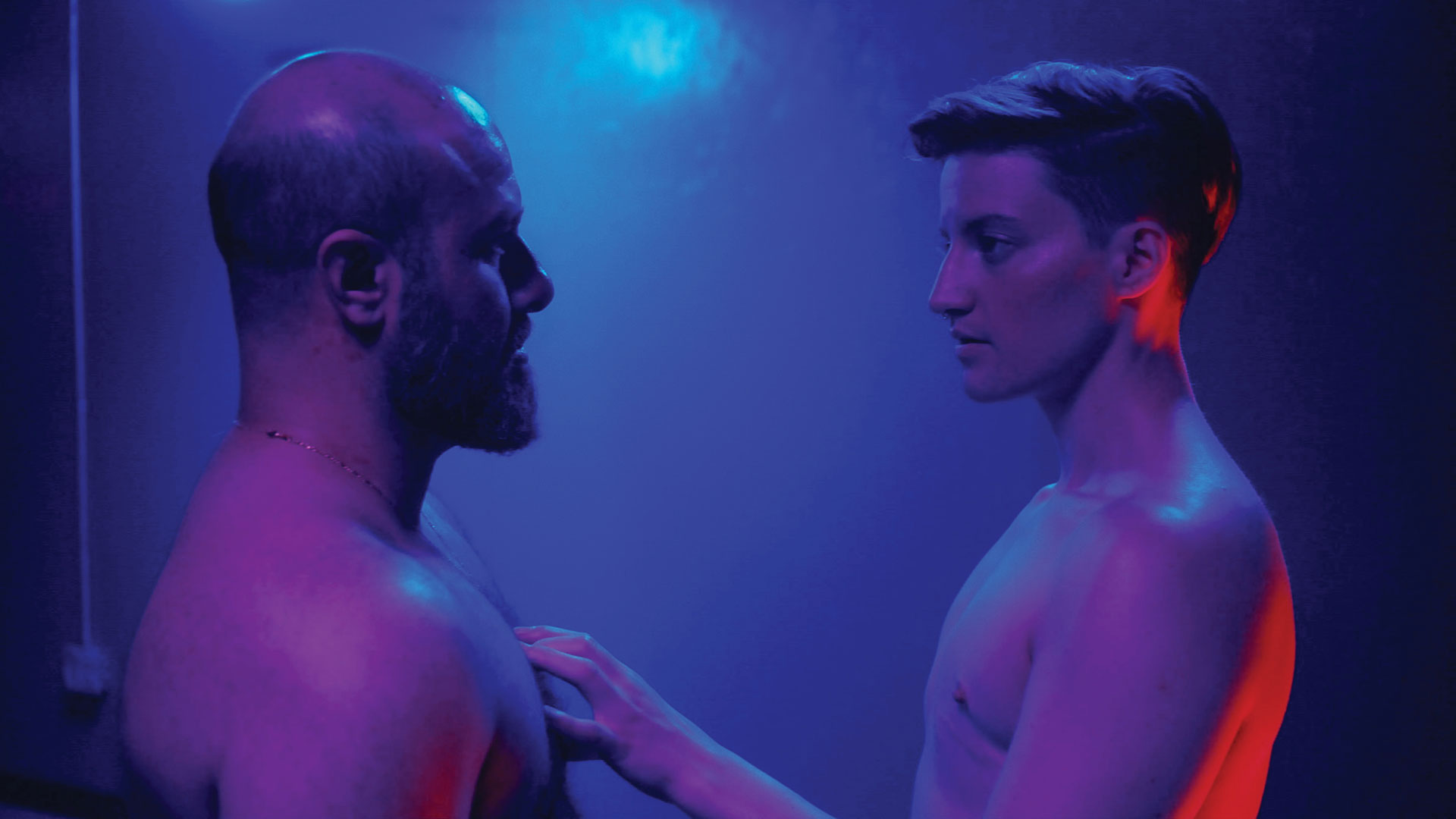“He’s really messy and I really like that,” actor Theo Germaine says about their character Aaron in Spark, the new film by writer/director Nicholas Giuricich. The film lets Germaine showcase their vulnerability as an actor with a complex, layered performance. “There’s this trend for actors like me to play characters who are super good. I’m thinking about audition breakdowns that I get that are specifically listed for trans and non-binary people.” Germaine describes a roster of simplified types: the brain, the virtuous best friend, the magical sidekick.
“Aaron is just kind of a mess. He’s all over the place and he is desperate and he makes bad decisions. I liked playing a character that was not perfect in any way.”
Germaine, speaking with Xtra via Zoom, takes the lead in Spark, which premieres at Toronto’s Inside Out 2SLGBTQ+ Film Festival. The actor enjoys a refreshingly dynamic turn as an early 30-something caught in a time loop that forces him to repeat a hot, if messy, first date with Trevor (Danell Leyva), a stranger he meets as part of a scavenger hunt en route to a friend’s birthday party. Aaron keeps echoing his mistakes in an effort to get closer to Trevor at the risk of growing apart from BFF Dani (Vico Ortiz), to whom he continually returns upon waking up and beginning the day anew.

Danell Leyva and Theo-Germaine star in Nicholas Giuricich’s Spark. Credit: Courtesy of Berlin and ReKon Productions
Spark complements Germaine’s other project at the festival, the Sundance award winner Desire Lines, and, with two films at the festival, marks them as a star to watch in a breakthrough generation for trans and non-binary representation. Desire Lines casts Germaine as Kieran, an archivist who helps curious trans man Ahmad (Aden Hakimi) feel comfortable with his sexual attraction to other men after transitioning. Both films see Germaine play characters who share what it means to feel comfortable in one’s own skin while exploring the bodies of their onscreen counterparts and navigating the laws of attraction.
Spark, for example, depicts lovers and friends without labels. The film reflects an intimate environment in which characters don’t need to signpost who they are. Aaron wakes up every morning to the comfort of trans and non-binary roommate Dani, who clearly likes him but then relives the same problematic day because he feels invigorated by the spark during his encounter with the traditionally masculine Trevor. The Groundhog Day-like narrative explores the cyclical nature of toxic relationships that can pull people back in when they’re consumed by passion. Germaine says it was a lot of fun to explore their vulnerability.
“I haven’t really gotten to act on screen without my shirt on a lot, and there are some shots where you can very clearly see my top surgery scars. I watched the movie recently and I felt really proud of myself, especially the scenes with my and Vico’s characters,” Germaine says. “It meant a lot.”
With the shoot for Spark running only 13 days, Germaine says the team worked closely to hit the right emotional beats in a story that plays like a queer spin on Groundhog Day. Moreover, the modest indie budget means that the cast and crew couldn’t shoot sequentially, so actors juggled different time stamps one day, and revisited them with other co-stars the next.
“It was fun, but also hard, because everybody had to pay close attention to what the given circumstances were of each moment and what the truth was of every scene,” Germaine says. “When you’re doing a movie about time distortion and you’re shooting out of order, and working within two weeks to do the whole project, it starts to mess with your sense of time.”
Germaine says the hardest part of making Spark was getting the intimate moments just right. “I got really overwhelmed and a little emotional. It was very vulnerable to do so much with one person for such a long time,” they say. “DJ [Levya] was really there for me, and the intimacy coordinator was really there for me.”
Aaron’s time loops in Spark are triggered during sex scenes with Trevor, frequently when one of them escalates the passion to get a little rougher. However, Germaine says that talking the scenes out with their co-stars and the intimacy coordinator aided with the literal and figurative nakedness that Spark required of them. “We all came to it with this physical sense of play,” Germaine says, noting that everyone’s experience with physical performance aided the production. (Germaine’s background includes theatre, dance, comedy and circus work; Ortiz is a seasoned drag king and Levya is a three-time Olympic medalist for gymnastics and a Cirque du Soleil performer.)
Spark also lets Germaine and their co-stars deliver rich, fully lived-in performances by doing away with the exposition, coming out narratives, and affirmation stories that too frequently define queer characters. “I think it is a great example of showing that queer actors can act,” Germaine says. “I’ve done my fair share of projects where it’s literally like, ‘This is who I am and I’m trans’ and all of that, but I love it when I don’t have to talk about that because then you get to see a different side of the actors. We need more examples of queer actors acting well and not just doing Stereotype A, which still happens. It’s hard. It’s rough out there.”
Germaine’s performance in Spark is especially compelling when one sees it alongside their work in Desire Lines, which boldly foregrounds transmasculine bodies and elements of performance. The hybrid film by director Jules Rosskam joins recent works like Framing Agnes and No Ordinary Man by shattering binaries of fiction and non-fiction. The film includes everyday trans people in interviews interwoven with narrative elements.
Interviews see Rosskam ask various trans men about their relationships with their genitals, a question that draws a mix of responses—ambivalence, reticence, acceptance and joy.
Germaine says they didn’t get to see these interviews prior to filming their scenes in Desire Lines, but they appreciate the range of perspective and humour the participants bring to the film. “A lot of people in the interview portions are people that I know personally or in the community,” says Germaine, who grew up in Murphysboro, Illinois, and has lived in Chicago, where many of the interviewees are based. “I love seeing local people on screen and hearing their voices. It’s great history and I love that Lou Sullivan is a centrepiece of the film. He’s a big deal to me.”
Sullivan, an American writer and activist who entered the public eye as the first known trans man who came out as gay after transitioning, becomes a key story in Desire Lines. As Germaine’s character Kieran helps Ahmad, a trans man exploring attraction between trans men, research their history, the archivist draws attention to Sullivan’s work lobbying the American Psychiatric Association to remove sexual orientation as a screening criteria and allow gay trans men access to hormones and surgery.
“I learned about him sometime when I was in high school,” the 32-year-old Germaine says. The actor says they could relate to the activist, who was born in Wisconsin, by recognizing their experience as a queer Midwesterner.
“Everybody comes out differently. Everybody’s journey is different. My ‘journey’ is that the first thing I came out as is trans,” notes Germaine, who came out in their teens. Germaine says that encountering Sullivan’s story helped them understand the fluidity of attraction. “Lou Sullivan’s story was very validating because he pushed the needle on the fact that trans men can be gay.”
Desire Lines playfully shows love lives that flourish as Kieran further assists Ahmad in his research outside the stacks. The film contrasts the nature of strolling the archives with cruising a bathhouse as Kieran and Adam explore each other’s bodies in dreamy interludes in the baths.
The films complement each other thematically in the sense that Aaron, Trevor and Dani, in Spark, act out many impulses that Kieran helps Ahmad discover in Desire Lines. Characters find self-love as the route to intimacy with another person. “Definitely both of the characters, Kieran and Aaron, have daddy issues,” Germaine says, laughing. “Kieran was more of the character who was like, ‘I will lead you down this journey,’ and Aaron’s more of the person who’s like, ‘Please lead me down this journey.’ … The characters both have a pretty intense fear of intimacy because they’ve legitimately been hurt by people in the past, but then that makes them.”
While leading two groundbreaking works in 2024 certainly makes Germaine a notable figure in a new wave of trans cinema, the actor’s work builds upon momentum they made as a series regular in shows like The Politician (2019) and Work in Progress in (2020). However, while critics cited Germaine’s performances in both series as evidence of positive breakthrough for queer representation on screen, Work in Progress was cancelled after two seasons, while The Politician has yet to be renewed for a third.
“It was hard doing seasons back to back, and then the pandemic happened, things changed and for a lot of us, it’s been hard to find more regular work,” Germaine says, adding that both series offered positive experiences. “Then Work in Progress got cancelled, and I still have no idea if The Politician will continue in any sort of way.”
The two series are unfortunate casualties in a media landscape that makes a lot of noise for queer representation, but struggles to follow through with too many series ending prematurely when streamers and broadcasters deem them too niche. Alternatively, the specificity of the love stories in Spark and Desire Lines may be niche on the surface, but universal in their resonance as characters work through the obstacles in their love lives.
Germaine says there’s more work to be done for representation—and they hope to be a part of it. “I think that people who are not LGBTQ2S+ will sometimes not want to connect with material because it’s about sexuality, so if you’re going to make it about sexuality, can it be more [accessible], but there should be more queer radical things in the media,” they say. Germaine adds that they find the industry isn’t as welcoming for queer artists as it was only a few years ago.
With the rise in trans visibility bringing a backlash in anti-trans policies, and sharper polarization to work that expands the boundaries of gender and representations, Germaine says the role of representation in our culture informs everything they do as a creator. “I’m thinking really hard about how to adapt and how to not be afraid, how to expand my own consciousness and my own ideas around writing. And maybe I’ve got to watch my back, but I’m still interested in being in the industry. I still want to act,” Germaine says. They hope that any headway that films like Spark and Desire Lines can make will hopefully expand the diversity of representation for bodies and identities on screen. “I’m going to continue to work really hard to try to make that happen, and maybe I can make one thing that will make a difference.”
Spark screens May 24 at the Inside Out festival in Toronto and virtually beginning May 25.
Desire Lines screens May 25 at Inside Out and virtually beginning May 26.


 Why you can trust Xtra
Why you can trust Xtra


